Photo AI
Last Updated Sep 26, 2025
Character Analysis Simplified Revision Notes for A-Level OCR English Literature
Revision notes with simplified explanations to understand Character Analysis quickly and effectively.
310+ students studying
Character Analysis
King Lear
Overview
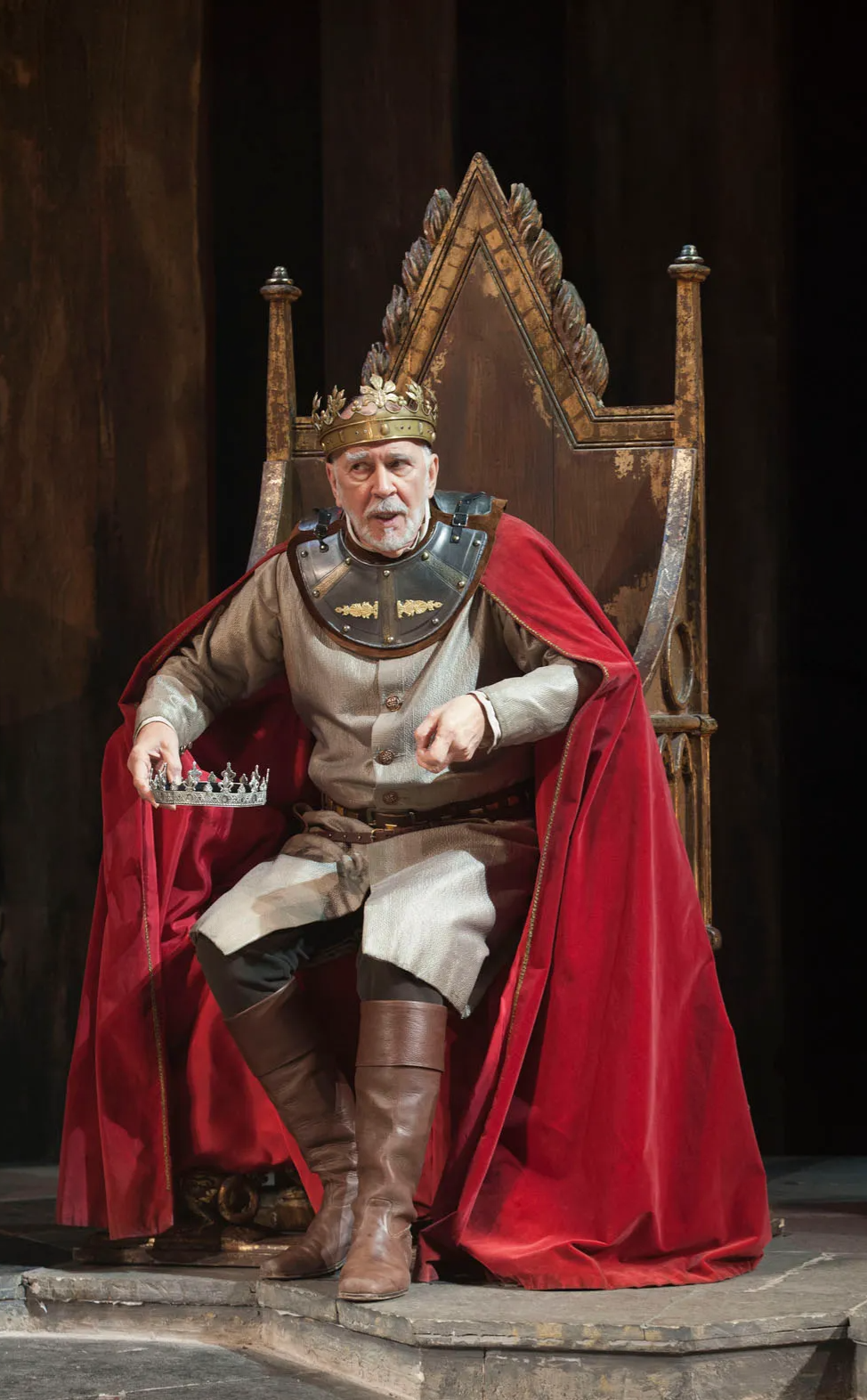
King Lear, the tragic protagonist of Shakespeare's play "King Lear," is a complex character whose descent into madness and self-realization highlights themes of power, betrayal, and redemption. Initially a powerful monarch, Lear's decision to divide his kingdom based on flattery leads to his downfall, as his misplaced trust in his deceitful daughters, Goneril and Regan, contrasts with his rejection of his loyal daughter, Cordelia. This error in judgment sets off a chain of events that strips Lear of his authority and sanity, exposing his vulnerability and humanity. Lear's journey is marked by his struggle with pride, his growing madness, and ultimately his poignant quest for redemption through reconciling with Cordelia, though it is tragically too late.
Key Moments in the Play
- Division of the Kingdom (Act 1, Scene 1): Lear's decision to divide his kingdom based on his daughters' declarations of love sets the tragic events in motion. His disowning of Cordelia marks the beginning of his downfall.
- Storm on the Heath (Act 3, Scene 2): Lear's exposure to the storm symbolizes his inner turmoil and growing madness. This scene reflects his realization of human frailty and the false nature of his daughters' love.
- Reunion with Cordelia (Act 4, Scene 7): Lear's reunion with Cordelia signifies his recognition of his mistakes and his journey towards redemption, although it is short-lived.
- Death of Cordelia and Lear (Act 5, Scene 3): The tragic conclusion of the play sees Lear holding Cordelia's dead body, overwhelmed by grief and madness, leading to his death.
Key Themes
- Madness and Insight: Lear's descent into madness is paralleled by moments of profound insight into human nature and his flaws.
- Authority and Power: The play explores the responsibilities and burdens of power, showing Lear's initial misuse of authority and his eventual powerlessness.
- Betrayal and Loyalty: The contrast between the deceit of Goneril and Regan and the steadfast loyalty of Cordelia and Kent highlights the themes of trust and betrayal.
- Suffering and Redemption: Lear's suffering leads to a painful journey of self-awareness and an attempt at redemption through his reconciliation with Cordelia.
Key Quotes
"Which of you shall we say doth love us most?" (Act 1, Scene 1)
- This quote is Lear's demand for his daughters to declare their love for him in exchange for portions of his kingdom.
- The quote highlights Lear's vanity and poor judgment, setting the stage for his downfall as he is deceived by false flattery.
"Blow, winds, and crack your cheeks! Rage! Blow!" (Act 3, Scene 2)
- Lear is addressing the storm, venting his fury and frustration against the elements as he descends into madness.
- This powerful imagery reflects Lear's inner turmoil and loss of control, symbolizing his break from reality.
"I am a man more sinned against than sinning." (Act 3, Scene 2)
- Lear acknowledges the injustices he has suffered, suggesting he has been wronged more than he has wronged others.
- This quote reveals Lear's growing self-awareness and the tragic realization of his vulnerability and mistakes.
"Cordelia, Cordelia! Stay a little." (Act 5, Scene 3)
- In this plea, Lear begs for more time with his deceased daughter, Cordelia, highlighting his grief and desperation.
- The quote underscores the tragedy of Lear's redemption coming too late, emphasizing the themes of loss and remorse.
Cordelia
Overview
Cordelia, the youngest daughter of King Lear, represents purity, honesty, and loyalty amidst the deceit and ambition of her sisters, Goneril and Regan. Unlike her sisters, Cordelia refuses to flatter Lear for personal gain, which leads to her disinheritance. Despite this, she remains devoted to her father, eventually leading an army to restore him to power. Her tragic end underscores the themes of love, sacrifice, and the consequences of integrity in a corrupt world.
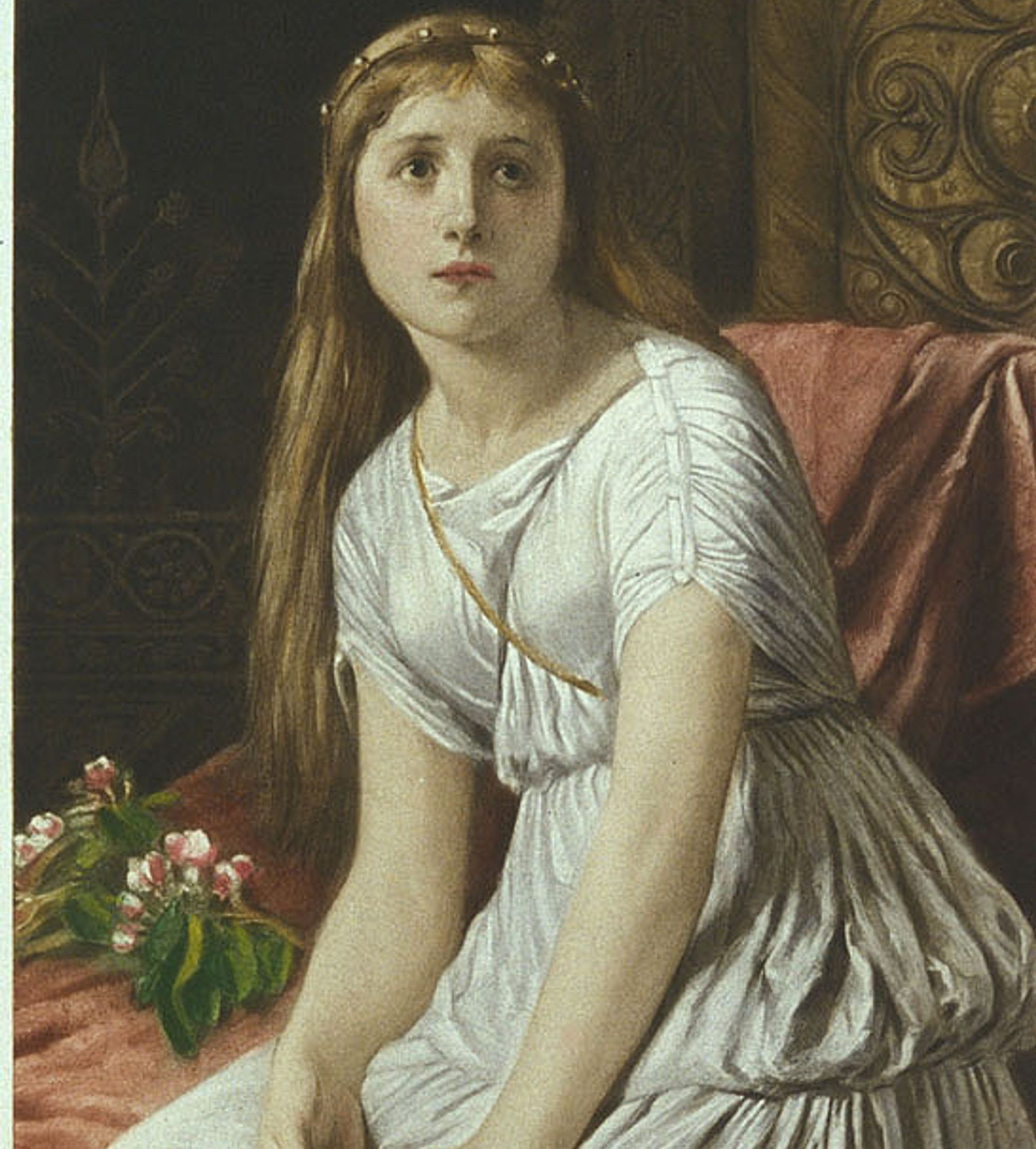
Key Moments in the Play
- Rejection by Lear (Act 1, Scene 1): Cordelia's refusal to exaggerate her love for Lear results in her disinheritance and banishment.
- Marriage to the King of France (Act 1, Scene 1): Despite her loss of dowry, the King of France marries Cordelia, recognizing her virtue.
- Return with an Army (Act 4, Scene 4): Cordelia returns to Britain with an army to rescue her father and restore order.
- Reunion with Lear (Act 4, Scene 7): Cordelia reunites with Lear, demonstrating her enduring love and forgiveness.
- Death (Act 5, Scene 3): Cordelia is captured and hanged on Edmund's orders, dying tragically despite her efforts to save her father.
Key Themes
- Loyalty and Betrayal: Cordelia's steadfast loyalty to Lear contrasts sharply with the betrayal of her sisters.
- Integrity and Honesty: Her refusal to engage in deceit highlights the theme of honesty in a world rife with corruption.
- Sacrifice and Redemption: Cordelia's actions embody sacrifice as she risks her life to save Lear, seeking his redemption.
- The Nature of True Love: Cordelia's love for her father is genuine and selfless, contrasting with her sisters' false flattery.
Key Quotes
"Unhappy that I am, I cannot heave / My heart into my mouth." (Act 1, Scene 1)
- Cordelia speaks these lines when Lear demands that she declare her love for him. Unlike her sisters, she cannot lie or flatter insincerely.
- This quote illustrates Cordelia's integrity and her inability to engage in deceit, setting her apart from Goneril and Regan.
"Time shall unfold what plighted cunning hides: / Who covers faults, at last shame them derides." (Act 1, Scene 1)
- Cordelia warns her sisters that their deceitful nature will eventually be revealed.
- The quote highlights Cordelia's belief in the eventual triumph of truth and justice over deception and falsehood.
"O dear father, / It is thy business that I go about." (Act 4, Scene 4)
- Cordelia expresses her commitment to restoring her father's dignity and authority.
- This demonstrates her unwavering loyalty and willingness to take action for the sake of her father's well-being.
"We are not the first / Who, with best meaning, have incurred the worst." (Act 5, Scene 3)
- Cordelia consoles Lear, reflecting on their misfortunes despite their good intentions.
- This quote underscores the theme of sacrifice and the harsh reality that good intentions do not always lead to positive outcomes.
Goneril
Overview
Goneril, the eldest daughter of King Lear, is one of the primary antagonists in Shakespeare's "King Lear." She is characterized by her ruthless ambition, deceit, and lack of filial piety. Goneril's actions are driven by a desire for power and control, which leads her to betray her father and plot against her siblings. Her manipulative nature and cruelty significantly contribute to the tragedy's unfolding and Lear's descent into madness.
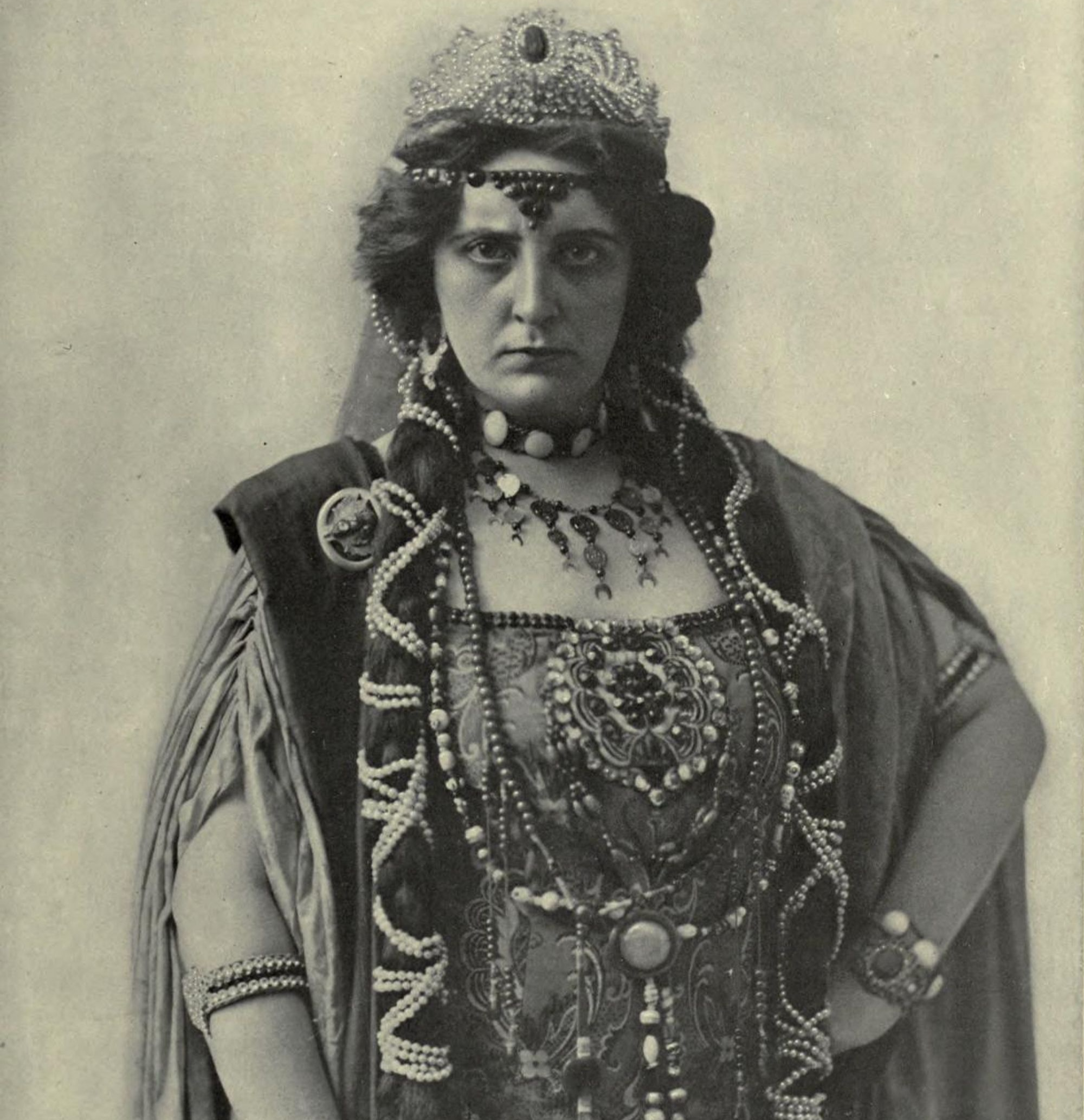
Key Moments in the Play
- Flattery to Gain Power (Act 1, Scene 1)****: Goneril professes exaggerated love for Lear to secure her share of the kingdom.
- Maltreatment of Lear (Act 1, Scene 3): Goneril becomes frustrated with Lear's demands and begins to plot against him, instructing her servants to be neglectful.
- Alliance with Regan and Edmund (Act 2, Scene 4): Goneril conspires with her sister and Edmund to solidify her power, showing her willingness to betray even her family.
- Poisoning Regan (Act 5, Scene 3): Goneril poisons her sister out of jealousy over Edmund, showcasing her extreme ruthlessness.
- Suicide (Act 5, Scene 3): Overwhelmed by guilt and the consequences of her actions, Goneril takes her own life.
Key Themes
- Power and Ambition: Goneril's quest for power drives her to manipulate and betray those around her, including her father and sister.
- Deceit and Betrayal: Her deceptive nature and betrayal of familial bonds are central to her character and the play's conflict.
- Moral Corruption: Goneril embodies moral decay, as she is willing to commit heinous acts to achieve her goals.
- Sibling Rivalry: The intense rivalry between Goneril and Regan, exacerbated by their mutual desire for Edmund, highlights the destructive potential of unchecked ambition.
Key Quotes
"Old fools are babes again." (Act 1, Scene 3)
- This quote reflects Goneril's disdain for her father, comparing him to a child due to his perceived foolishness and vulnerability.
- The analysis shows her lack of respect for Lear and her belief in his weakness, setting the stage for her mistreatment of him.
"I love you more than word can wield the matter." (Act 1, Scene 1)
- Goneril declares her love for Lear with insincere flattery to gain her portion of the kingdom.
- This quote underscores her manipulative nature and the deceit she uses to secure power.
Pluck out his eyes." (Act 3, Scene 7)
- Goneril's command to blind Gloucester illustrates her cruelty and willingness to resort to extreme violence.
- This quote highlights the depth of her ruthlessness and the lengths she will go to maintain control.
"How now, Edmund! What news?" (Act 5, Scene 3)
- Goneril's eagerness for news from Edmund shows her involvement in the play's political and personal machinations.
- This demonstrates her active participation in the betrayal and manipulation central to the play's conflicts.
Edmund
Overview

Edmund, the illegitimate son of the Earl of Gloucester, is one of the principal villains in Shakespeare's "King Lear." Driven by ambition and resentment over his illegitimacy, Edmund schemes to usurp his legitimate brother Edgar's position and gain power. His cunning and ruthless actions propel much of the play's conflict, as he manipulates and betrays those around him to achieve his goals. Edmund's character embodies themes of ambition, betrayal, and the subversion of social and familial norms.
Key Moments in the Play
- Soliloquy on Bastardy (Act 1, Scene 2): Edmund reveals his resentment over his illegitimacy and his determination to overturn the social order that favours his legitimate brother Edgar.
- Deception of Gloucester (Act 1, Scene 2): Edmund tricks his father into believing that Edgar is plotting against him, leading to Edgar's flight and Gloucester's trust in Edmund.
- Alliance with Goneril and Regan (Act 2, Scene 1)****: Edmund aligns himself with Lear's treacherous daughters, furthering his ambitions and complicating the political landscape.
- Betrayal of Gloucester (Act 3, Scene 7): Edmund betrays his father to Cornwall and Regan, resulting in Gloucester's blinding.
- Death and Repentance (Act 5, Scene 3): Mortally wounded by Edgar, Edmund reveals his plans to have Lear and Cordelia killed, showing a brief moment of remorse before his death.
Key Themes
- Ambition and Power: Edmund's relentless pursuit of power and status drives his actions throughout the play, highlighting the destructive potential of unchecked ambition.
- Betrayal and Deception: His manipulative and deceitful nature exemplifies the theme of betrayal, as he turns against his family and allies to achieve his aims.
- Legitimacy and Social Order: Edmund's resentment of his illegitimacy and his efforts to overturn the social hierarchy reflect the play's exploration of social and familial norms.
- Nature and Natural Order: His invocation of nature and rejection of social conventions underscore the tension between human constructs and instincts.
Key Quotes
"Thou, Nature, art my goddess." (Act 1, Scene 2)
- Edmund declares his allegiance to nature, rejecting the social order that favours legitimate offspring.
- This quote highlights Edmund's rejection of societal norms and his embrace of a more primal, survival-of-the-fittest mentality.
"Now, gods, stand up for bastards!" (Act 1, Scene 2)
- Edmund calls upon the gods to support those born out of wedlock, asserting his worth and challenging the stigma of illegitimacy.
- This illustrates his defiance and ambition, as he seeks to redefine his status and challenge the established order.
"The younger rises when the old doth fall." (Act 3, Scene 3)
- Edmund reflects on the transfer of power from the old generation to the new, anticipating his rise as his father Gloucester falls.
- This quote underscores the theme of generational conflict and the ruthless nature of Edmund's ambition.
"Yet Edmund was beloved." (Act 5, Scene 3)
- As he lies dying, Edmund reflects on the fact that he was loved, despite his villainous actions.
- This moment of introspection reveals a more human side to Edmund, highlighting the complexity of his character and the tragedy of his wasted potential.
Edgar
Overview
Edgar, the legitimate son of the Earl of Gloucester, is one of the play's central characters who undergoes significant transformation. Initially portrayed as naive and trusting, Edgar is quickly forced into a life of disguise and hardship due to his half-brother Edmund's treachery. Assuming the guise of "Poor Tom", Edgar navigates through deception and madness, ultimately emerging as a heroic figure who seeks to restore justice. His journey reflects themes of loyalty, identity, and resilience.
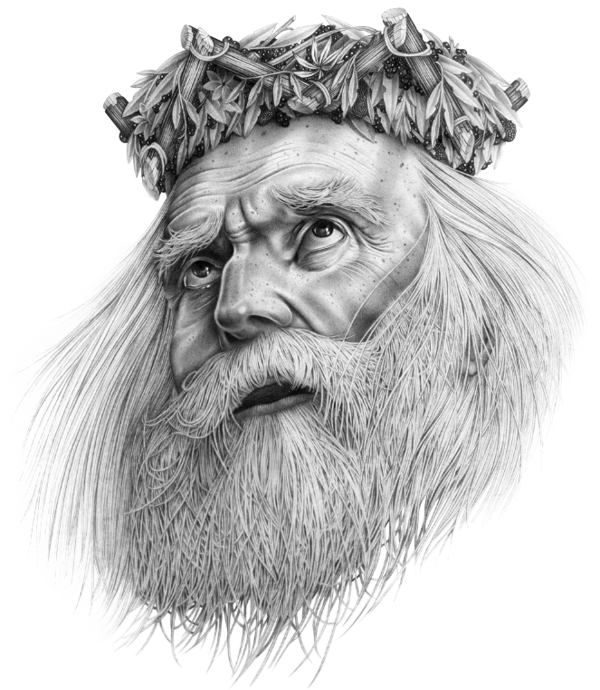
Key Moments in the Play
- Fleeing from Gloucester's Castle (Act 2, Scene 3): Edgar escapes from his father's wrath by disguising himself as "Poor Tom", a mad beggar, to avoid being captured and killed.
- Encounter with Lear in the Storm (Act 3, Scene 4): Edgar, in disguise, meets the mad King Lear on the heath, symbolizing the chaos and madness that engulf the kingdom.
- Revealing His Identity to Gloucester (Act 4, Scene 6): Edgar reveals his true identity to his blind father, Gloucester, in a moment of reconciliation and forgiveness.
- Defeating Edmund (Act 5, Scene 3): Edgar fights and defeats his treacherous half-brother Edmund in a duel, bringing justice and restoring his honour.
Key Themes
- Identity and Disguise**:** Edgar's transformation from a nobleman to a mad beggar explores themes of identity, social status, and the human condition.
- Loyalty and Betrayal: Despite being wronged, Edgar remains loyal to his father and seeks justice, contrasting with Edmund's betrayal.
- Suffering and Redemption: Edgar's journey is one of suffering and endurance, leading to eventual redemption and restoration of his status.
- Madness and Insight: His time as "Poor Tom" allows Edgar to gain a deeper understanding of human suffering and madness.
Key Quotes
"Edgar I nothing am." (Act 2, Scene 3)
- Edgar states this line as he adopts the disguise of "Poor Tom," symbolizing his complete loss of identity and status.
- This quote highlights the theme of identity and transformation, as Edgar must strip away his former self to survive.
"The worst is not / So long as we can say 'This is the worst.'" (Act 4, Scene 1)
- Edgar reflects on his suffering and the human capacity to endure hardship, suggesting that as long as one can acknowledge their suffering, it is not the absolute worst.
- This quote underscores Edgar's resilience and philosophical insight gained through his experiences.
"My name is Edgar, and thy father's son." (Act 5, Scene 3)
- Edgar reveals his true identity to Edmund during their duel, asserting his legitimacy and right to justice.
- This moment signifies Edgar's reclaiming of his identity and his role as an agent of justice against his treacherous brother.
"Why I do trifle thus with his despair / Is done to cure it." (Act 4, Scene 6)
- Edgar explains his use of deception to help his father Gloucester overcome his despair and suicidal thoughts.
- This quote illustrates Edgar's compassion and strategic thinking, as he uses his disguise to guide and heal his father.
Kent
Overview
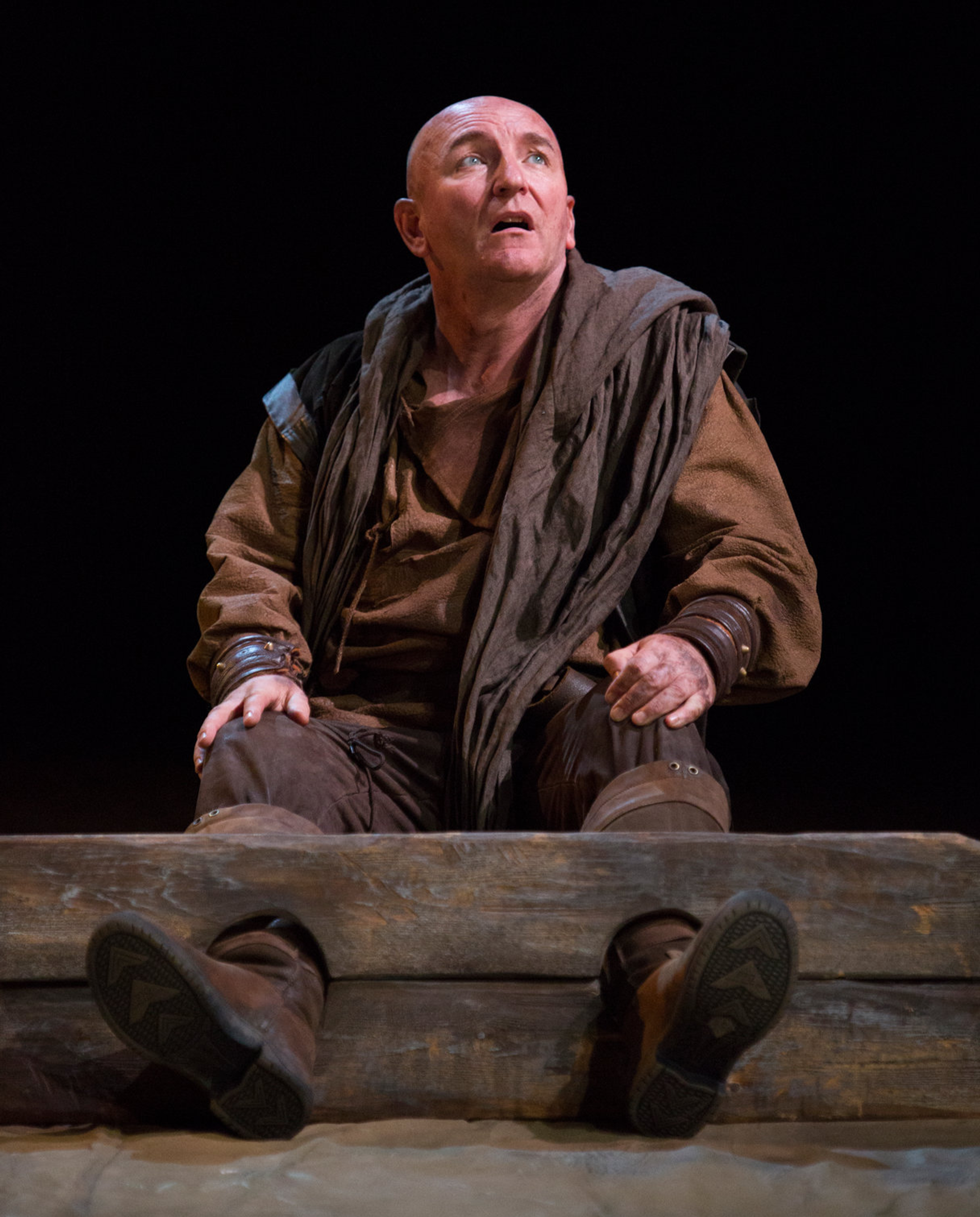
Kent, a nobleman of the same rank as Gloucester, is one of King Lear's most loyal and steadfast supporters. Banished by Lear for his outspoken defence of Cordelia, Kent remains devoted to Lear, returning in disguise as the servant Caius to continue serving him. His unwavering loyalty and honesty contrast sharply with the deceit and treachery of other characters, making him a symbol of integrity and devotion in the play.
Key Moments in the Play
- Defence of Cordelia (Act 1, Scene 1): Kent tries to intervene when Lear disowns Cordelia, demonstrating his commitment to truth and justice.
- Disguise as Caius (Act 1, Scene 4): After being banished, Kent disguises himself as a commoner named Caius to stay close to Lear and protect him.
- Support during the Storm (Act 3, Scene 2): Kent remains by Lear's side during the storm, guiding and protecting him despite the king's madness.
- Reunion with Cordelia (Act 4, Scene 7): Kent aids in reuniting Lear with Cordelia, showing his enduring loyalty.
- Final Moments (Act 5, Scene 3): After Lear's death, Kent hints at his impending death, suggesting he will follow his master even in death.
Key Themes
- Loyalty and Devotion: Kent's unwavering loyalty to Lear, even after being banished, highlights themes of true service and devotion.
- Honesty and Integrity: Kent's commitment to truth and his refusal to flatter or deceive set him apart from the more duplicitous characters.
- Disguise and Identity: His disguise as Caius explores themes of identity and the lengths to which he will go to serve Lear.
- Authority and Service: Kent's relationship with Lear underscores the complexities of authority and service, as he remains loyal despite Lear's faults and mistreatment.
Key Quotes
"See better, Lear; and let me still remain / The true blank of thine eye." (Act 1, Scene 1)
- Kent implores Lear to see the truth and keep him as his loyal advisor.
- This quote underscores Kent's commitment to truth and his role as a guide for Lear, highlighting his honest nature.
"Now, banished Kent, / If thou canst serve where thou dost stand condemned, / So may it come thy master, whom thou lov'st, / Shall find thee full of labors." (Act 1, Scene 4)
- Kent, now disguised as Caius, reflects on his willingness to serve Lear despite being banished.
- The quote illustrates Kent's dedication and the lengths he will go to remain loyal to Lear, emphasizing themes of loyalty and service.
"When majesty falls to folly. Reserve thy state, / And in thy best consideration check / This hideous rashness: answer my life my judgment, / Thy youngest daughter does not love thee least." (Act 1, Scene 1)
- Kent cautions Lear against disinheriting Cordelia, emphasizing the king's error in judgment.
- This quote shows Kent's bravery in speaking truth to power and his protective nature towards those who are wronged.
"I have a journey, sir, shortly to go; / My master calls me, I must not say no." (Act 5, Scene 3)
- Kent's final words hint at his death, suggesting he will follow Lear even in death.
- The quote reflects his deep loyalty and the bond between servant and master, completing his journey of unwavering service.
The Fool
Overview
The Fool in "King Lear" serves as the king's jester and is one of his most loyal companions. Unlike other characters, the Fool has the unique role of speaking truth to power through his witty, often cryptic remarks. His presence provides critical commentary on Lear's actions and decisions, using humour and song to convey insights. The Fool's loyalty to Lear remains steadfast, highlighting the themes of loyalty, wisdom, and folly in the play.
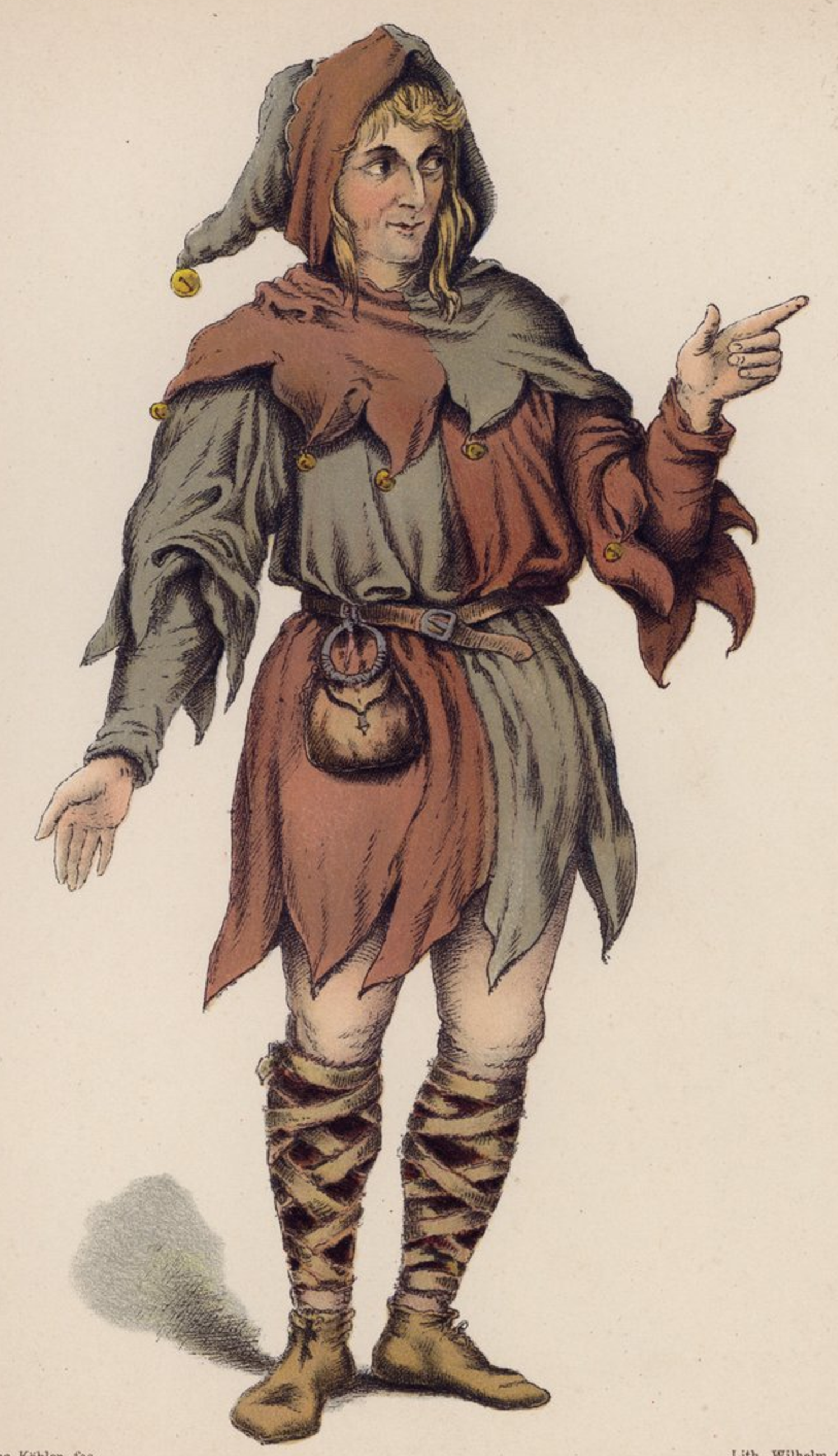
Key Moments in the Play
- First Appearance (Act 1, Scene 4): The Fool first appears after Lear has divided his kingdom, providing sharp commentary on Lear's folly in disinheriting Cordelia and trusting Goneril and Regan.
- Storm on the Heath (Act 3, Scene 2): The Fool remains with Lear during the storm, trying to provide comfort and counsel through his riddles and songs.
- Disappearance (Act 3, Scene 6): The Fool's final appearance occurs in the mock trial scene, after which he disappears from the play, symbolizing the loss of wisdom and the deepening of Lear's madness.
Key Themes
- Wisdom and Folly: The Fool's role is to highlight the folly of Lear's actions, juxtaposing his wisdom against Lear's lack of judgment.
- Loyalty and Service: His loyalty to Lear, despite the king's poor decisions, underscores the theme of true service and devotion.
- Truth and Honesty: Through his jests and songs, the Fool speaks the truth about Lear's situation and the nature of the other characters, acting as a moral compass in the play.
- Madness and Insight: The Fool's commentary often borders on madness, but it provides deep insights into Lear's character and the consequences of his actions.
Key Quotes
"Thou hadst little wit in thy bald crown when thou gavest thy golden one away." (Act 1, Scene 4)
- The Fool criticizes Lear for giving away his power to his deceitful daughters, indicating Lear's lack of wisdom.
- This quote highlights the Fool's role in pointing out Lear's mistakes and the irony of the king being outwitted by his own decisions.
"I am better than thou art now; I am a Fool, thou art nothing." (Act 1, Scene 4)
- The Fool compares his status with Lear's, suggesting that Lear's decision to abdicate his throne has rendered him powerless.
- This quote emphasizes the Fool's awareness of social and political dynamics, contrasting Lear's folly with the Fool's perceived wisdom.
"Here's a night pities neither wise men nor fools." (Act 3, Scene 2)
- The Fool remarks on the storm, noting that it shows no mercy to anyone, regardless of their wisdom or folly.
- This quote reflects the chaotic state of the kingdom and the equalizing force of nature, which affects all characters equally.
"Thou shouldst not have been old till thou hadst been wise." (Act 1, Scene 5)
- The Fool criticizes Lear for growing old without gaining wisdom, suggesting that true wisdom should come with age.
- This quote encapsulates the central irony of Lear's character: his lack of insight despite his years, highlighted by the Fool's sharp observations
Albany
Overview
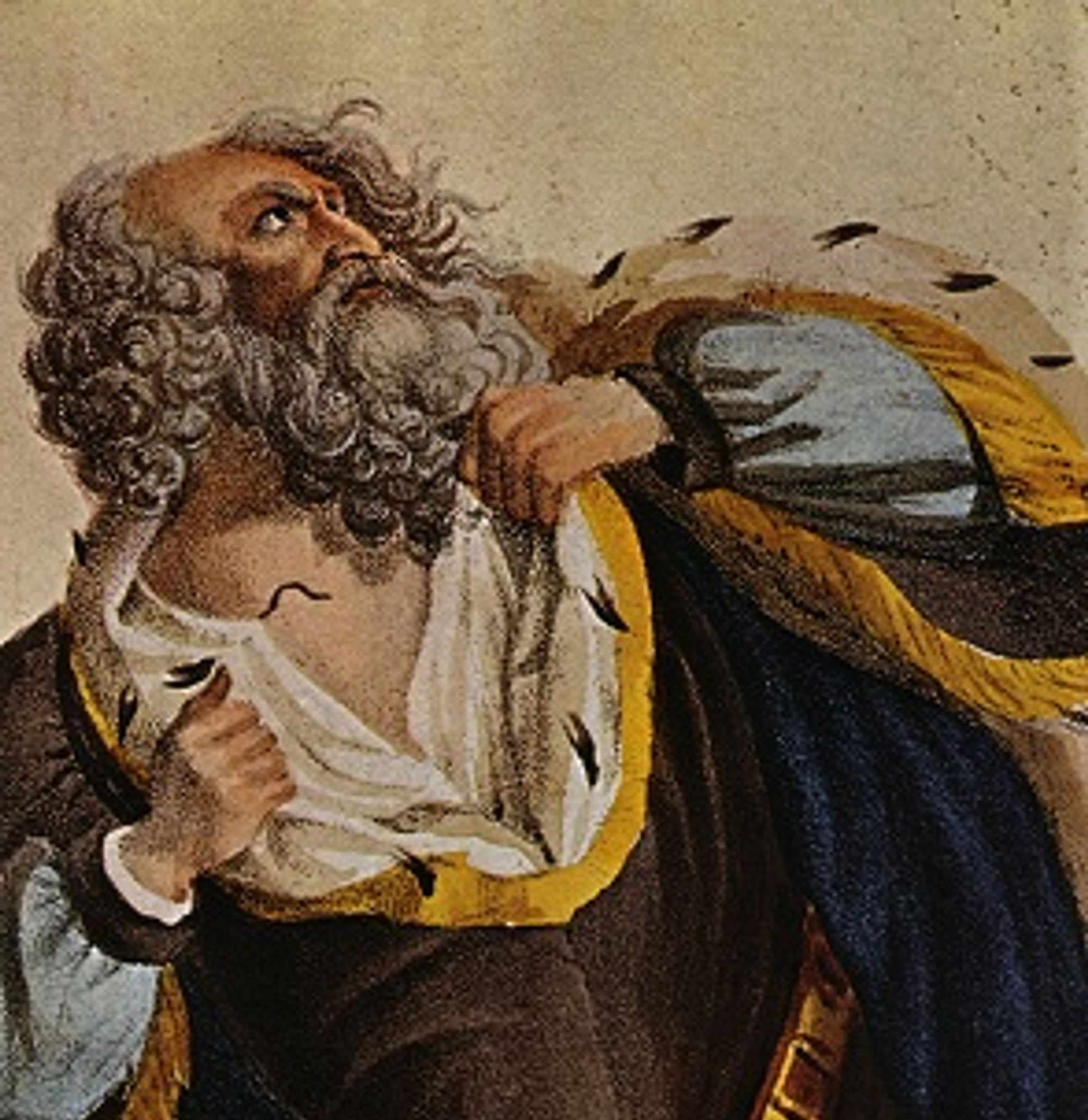
Albany, the husband of Goneril, is a character who evolves significantly throughout the play. Initially passive and seemingly complicit in his wife's schemes, Albany gradually emerges as a moral voice and a figure of justice. His transformation is marked by growing awareness and condemnation of the evil around him, leading to his active opposition against Goneril and her allies. Albany's character embodies themes of morality, justice, and redemption.
Key Moments in the Play
- Initial Passivity (Act 1, Scene 4): Albany shows little resistance to Goneril's mistreatment of Lear, appearing passive and submissive to his wife's authority.
- Realization of Goneril's Cruelty (Act 4, Scene 2): Albany begins to see Goneril's true nature, criticizing her for her treacherous behaviour and cruelty towards Lear and Gloucester.
- Condemnation of Edmund (Act 5, Scene 3): Albany exposes Edmund's treachery and challenges him, asserting his commitment to justice.
- Assumes Control (Act 5, Scene 3): After the deaths of Lear, Cordelia, Goneril, and Regan, Albany steps forward to restore order, highlighting his transformation into a just and moral leader.
Key Themes
- Moral Awakening: Albany's journey from passivity to moral action reflects the theme of awakening to justice and truth.
- Justice and Redemption: His actions in the latter part of the play emphasize the possibility of redemption and the restoration of justice.
- Good vs. Evil: Albany's opposition to Goneril and Edmund underscores the conflict between good and evil within the play.
- Leadership and Authority: Albany's assumption of control at the play's end symbolizes the re-establishment of rightful leadership and order.
Key Quotes
"How far your eyes may pierce I cannot tell: / Striving to better, oft we mar what's well." (Act 1, Scene 4)
- Albany cautiously questions Goneril's harsh treatment of Lear, hinting at his inner conflict and emerging awareness.
- This quote illustrates Albany's initial hesitation to confront Goneril directly, reflecting his struggle between loyalty to his wife and his sense of justice.
"Wisdom and goodness to the vile seem vile: / Filths savor but themselves." (Act 4, Scene 2)
- Albany condemns Goneril's immoral actions, asserting that those who are wicked cannot appreciate goodness.
- This marks a turning point for Albany, showcasing his moral clarity and his rejection of Goneril's corruption.
"Shut your mouth, dame, / Or with this paper shall I stop it." (Act 4, Scene 2)
- Albany commands Goneril to silence, taking a firm stand against her manipulations and deceit.
- This quote demonstrates Albany's newfound assertiveness and determination to oppose evil.
"Edmund, I arrest thee / On capital treason; and, in thy arrest, / This gilded serpent." (Act 5, Scene 3)
- Albany accuses Edmund of treason and denounces his treachery, asserting his authority and commitment to justice.
- This moment highlights Albany's role as a restorer of order and his transition into a righteous leader.
France
Overview
The King of France, who appears briefly in Shakespeare's "King Lear," is a minor yet significant character. He is one of Cordelia's suitors and becomes her husband after Lear disowns her. France's acceptance of Cordelia without a dowry underscores his virtue, contrasting with the greed and ambition displayed by many other characters. France's actions highlight themes of loyalty, integrity, and true love.
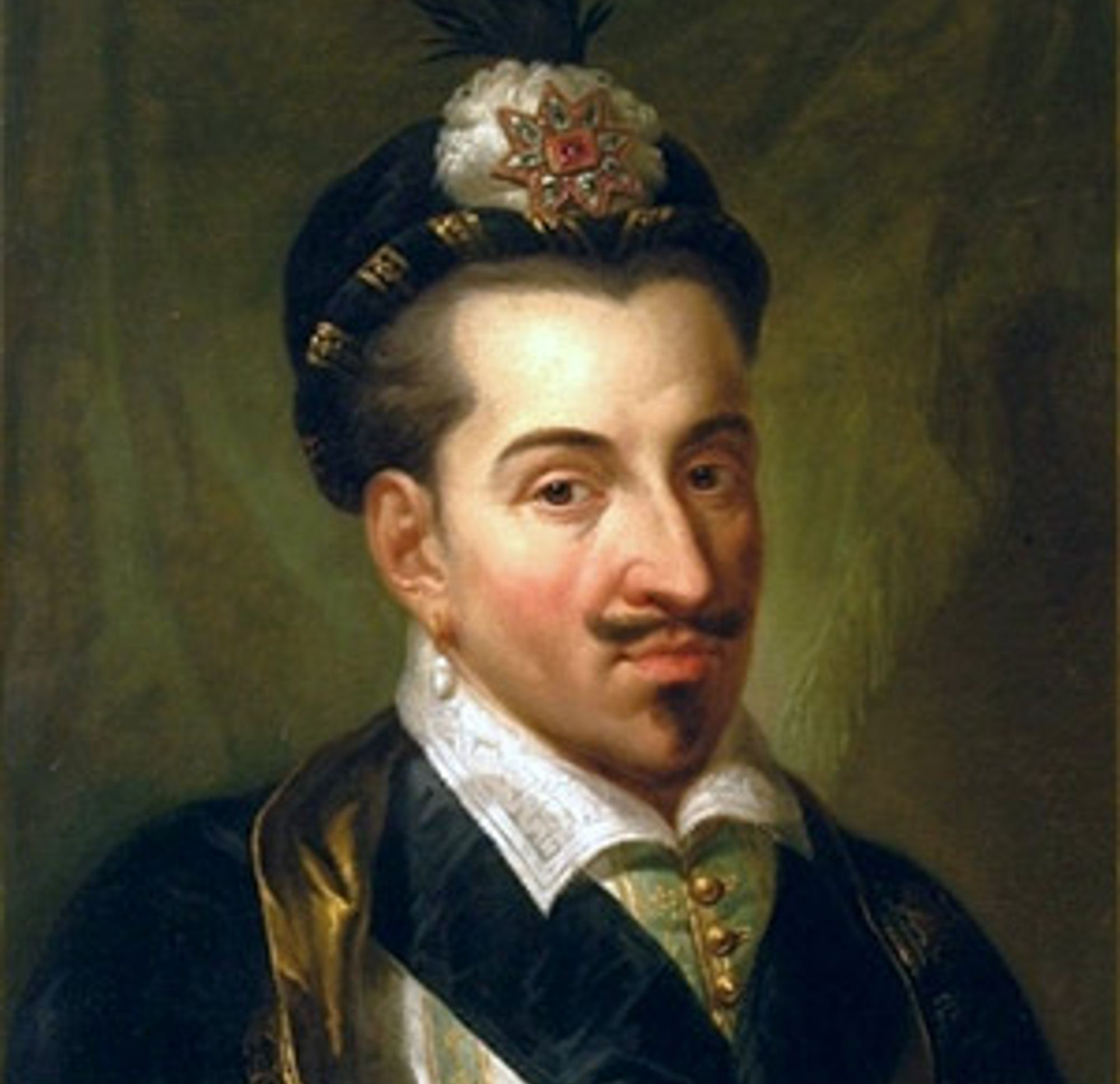
Key Moments in the Play
- Marriage to Cordelia (Act 1, Scene 1): Despite Lear's rejection of Cordelia and the loss of her dowry, France marries her, recognizing her true worth and virtue.
- Support for Cordelia (Act 1, Scene 1): France defends Cordelia's honesty and integrity when she is disowned by Lear, emphasizing her genuine nature.
- Sending Cordelia to England (Act 4, Scene 3): France sends Cordelia back to England with an army to help restore Lear's authority and rectify the wrongs done to him.
Key Themes
- True Love and Virtue: His acceptance of Cordelia despite her lack of material wealth highlights the theme of true love and virtue over superficial appearances.
- Loyalty and Integrity: France's decision to marry Cordelia without a dowry and his support for her father reflects his unwavering loyalty and integrity.
- Justice and Rectification: France's role in supporting Cordelia's return to England underscores the theme of seeking justice and rectifying wrongs.
Key Quotes
"Fairest Cordelia, that art most rich being poor." (Act 1, Scene 1)
- France addresses Cordelia, recognizing her inner worth despite her lack of dowry.
- This quote emphasizes France's appreciation of Cordelia's true value and integrity, contrasting with Lear's materialistic judgment.
"Love's not love / When it is mingled with regards that stand / Aloof from the entire point." (Act 1, Scene 1)
- France speaks these lines to Burgundy, criticizing him for refusing to marry Cordelia after she loses her dowry.
- The analysis highlights France's belief in unconditional love, demonstrating his integrity and contrasting with Burgundy's conditional affection.
"Thy dowerless daughter, king, thrown to my chance, / Is queen of us, of ours, and our fair France." (Act 1, Scene 1)
- France declares that Cordelia, despite being disowned by Lear, will be his queen and is fully accepted in France.
- This underscores France's acceptance of Cordelia for her virtues, showcasing his commitment to her regardless of her material status.
"Seek, seek for him; / Lest his ungoverned rage dissolve the life / That wants the means to lead it." (Act 4, Scene 3)
- France instructs his soldiers to find Lear, worried about the king's safety amidst his madness.
- This quote demonstrates France's concern for Lear's well-being, reflecting his role in seeking to restore order and justice.
500K+ Students Use These Powerful Tools to Master Character Analysis For their A-Level Exams.
Enhance your understanding with flashcards, quizzes, and exams—designed to help you grasp key concepts, reinforce learning, and master any topic with confidence!
60 flashcards
Flashcards on Character Analysis
Revise key concepts with interactive flashcards.
Try English Literature Flashcards6 quizzes
Quizzes on Character Analysis
Test your knowledge with fun and engaging quizzes.
Try English Literature Quizzes29 questions
Exam questions on Character Analysis
Boost your confidence with real exam questions.
Try English Literature Questions27 exams created
Exam Builder on Character Analysis
Create custom exams across topics for better practice!
Try English Literature exam builder12 papers
Past Papers on Character Analysis
Practice past papers to reinforce exam experience.
Try English Literature Past PapersOther Revision Notes related to Character Analysis you should explore
Discover More Revision Notes Related to Character Analysis to Deepen Your Understanding and Improve Your Mastery
